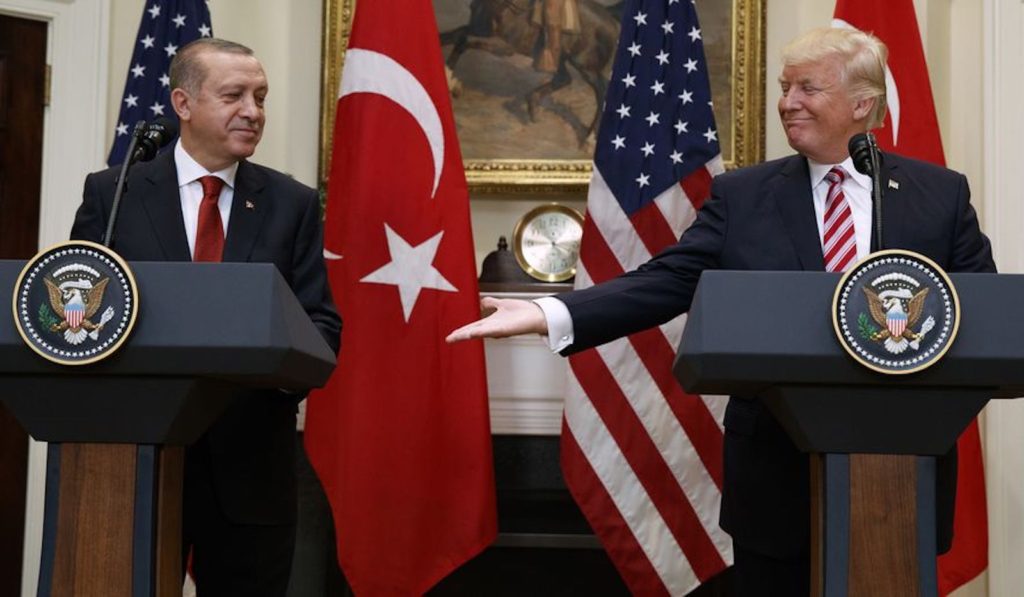A White House account of U.S. President Donald Trump’s January 24 phone call with his Turkish counterpart Recep Tayyip Erdogan appeared to signal a shift in Washington’s approach to bilateral relations and prompted a strong rebuke from Ankara, which denied details of the U.S. statement.
Trump and Erdogan’s call was announced earlier in the week by Turkish media, which framed it as a chance for the Turkish president to explain his reasons for launching Operation Olive Branch, the military incursion into Efrin which targets the predominately Kurdish People’s Protection Units (YPG) but has been blamed for the death of at least 20 civilians since it began on Saturday.
Erdogan was expected to reiterate Ankara’s stance that the U.S. must end support for the YPG, the backbone of the Syrian Democratic Forces, the main American partner fighting Islamic State in Syria.
Ankara considers the YPG and its linked Democratic Union Party (PYD) – which controls the “canton” of Efrin in Syria – to be extensions of the Kurdistan Workers’ Party (PKK), a Turkey-based insurgent group that is a listed terror group in both Turkey and the U.S. Despite years of outcry from Ankara, the U.S. military in general and the anti-ISIS Coalition in particular have partnered with the SDF.
According to Turkey’s Anadolou Agency, Erdogan did (again) urge Trump to drop support for the YPG and its affiliates.
According to the White House readout of the phone call:
President Trump relayed concerns that escalating violence in Afrin, Syria, risks undercutting our shared goals in Syria.
He urged Turkey to deescalate, limit its military actions, and avoid civilian casualties and increases to displaced persons and refugees.
He urged Turkey to exercise caution and to avoid any actions that might risk conflict between Turkish and American forces. He reiterated that both nations must focus all parties on the shared goal of achieving the lasting defeat of ISIS.
Moreover, Trump apparently “also expressed concern about destructive and false rhetoric coming from Turkey, and about United States citizens and local employees detained under the prolonged State of Emergency in Turkey.”
Trump’s stated comments broke with several years of U.S. public statements about leaders’ conversations. Throughout the last year of the Obama administration’s tenure, White House, State Department and Pentagon readouts regularly included acknowledgment of Turkey’s “legitimate security concerns” with respect to the PKK.
Indeed, the White House said Trump and Erdogan did pledge “to improve the strategic partnership between the United States and Turkey, particularly in fostering regional stability and combating terrorism in all its forms” – a common U.S. refrain since the Obama years – but coupled the PKK with ISIS, al-Qaeda and “Iranian-sponsored terrorism” (which was not elaborated on in the readout).
Ankara soon directly disputed the U.S. version of the phone call.
“Sources say White House readout on phone call between Erdoğan and Trump does not reflect the precise content of the conversation. U.S President Trump did not mention “concern on escalating violence” regarding the op in Afrin,” CNN Turk tweeted.
The Washington Post’s Liz Sly reported:
“Turkey disputes the WH account of the Trump-Erdogan call, including
*Trump did not share any “concerns [about] escalating violence” in Afrin
*Trump said the US has stopped arming the YPG
*President Trump did not use the phrase “destructive and false rhetoric coming from Turkey.'”
It remains to be seen whether it was Washington or Ankara (or both) that altered the tone of the call to appeal to their domestic audiences, but shortly after the readout was released reports broke out on social media that Turkey had struck Manbij, another Kurdish stronghold in Syria where American troops are present as part of the CJTF-OIR mission.
The airstrike reports have not been confirmed and appear to have been a false alarm, but the possibility of the two NATO allies clashing in a foreign country has been increasingly realistic since the Coalition said on January 13 that it was planning to turn 15,000 SDF fighters into a Syrian border security force that would be in part deployed along the Syria-Turkey border.
On Monday, Turkish Deputy Prime Minister Bekir Bozdag said the U.S. must stop supporting the YPG and review its forces on the ground in Syria if it wants to avoid “clashes” with Turkey.



